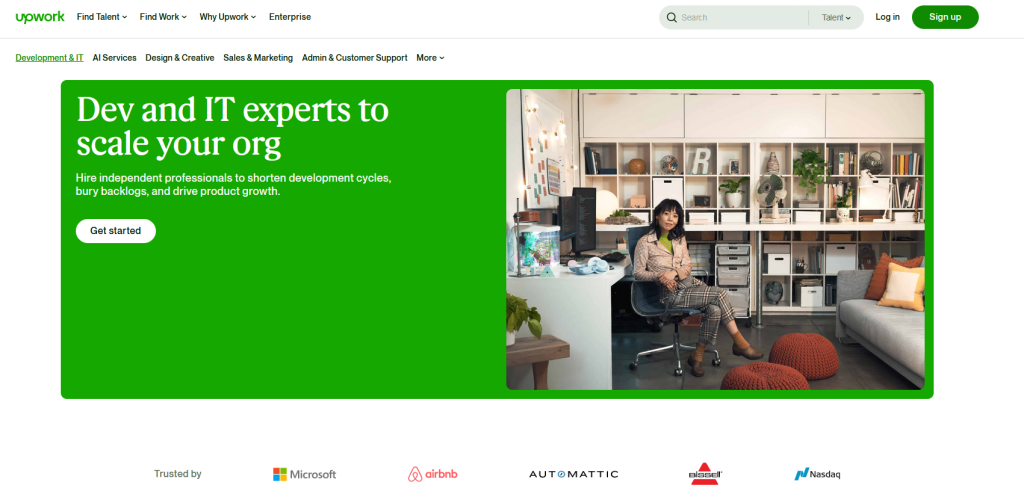Embracing Change: How the Future of the Gig Economy Will Revolutionize Employment
Last Updated on December 18, 2023
The workplace has changed a lot over the past 15 years. One of biggest trends that’s been on the rise is the gig economy. The gig economy is reshaping the way we view employment and practice it. With advancements in technology and the rise of remote work, more and more individuals are embracing the opportunities that the gig economy has to offer. This article explores how the future of the gig economy is set to revolutionize employment as we know it.
Flexibility has become the name of the game, as workers now have the freedom to choose when and where they work. Gig workers are no longer confined to the traditional 9-to-5 grind and an office space; instead, they have the ability to create their own schedule and pursue multiple projects simultaneously. This level of autonomy not only allows for a better work-life balance but also opens up new possibilities for career growth and fulfillment.
As companies continue to recognize the benefits of hiring gig workers, this trend is poised to become even more prevalent in the future. The gig economy offers businesses access to a diverse talent pool, allowing them to tap into specialized skills and knowledge on an as-needed basis. This shift in employment dynamics also presents opportunities for individuals to showcase their expertise, take on challenging projects, and build their personal brand.
short explanation first- What is the Gig Economy?
Think of the gig economy as a dynamic labor market characterized by short-term, independent work arrangements rather than traditional full-time employment. Here’s a breakdown of its key features:
- Freelance and contract work: Instead of salaried employees, companies and individuals hire independent workers for specific projects or tasks on a temporary basis. This includes activities like driving for ride-sharing apps, writing freelance articles, or doing graphic design projects.
- Online platforms: Many gig workers find and connect with clients through online platforms like Upwork, Fiverr, or Uber. These platforms act as intermediaries, streamlining the process and offering some form of security and reputation management.
- Flexibility and freedom: One of the main draws of the gig economy is the flexibility it offers. Workers can choose their projects, manage their schedules, and potentially work from anywhere. This appeals to people seeking work-life balance, additional income, or pursuing entrepreneurial ventures.
- Challenges and drawbacks: While flexibility is a plus, the gig economy also comes with challenges. Workers often lack benefits like health insurance and paid time off, have irregular income, and face uncertainties in project availability. Job security and worker rights can also be concerns. For the employers it’s getting harder to retain employees, and gain employee loyalty and commitment.

The future : technological advancements and automation
The future of the gig economy is closely integrated with technological advancements and automation. As technology continues to advance at an it is expected to disrupt traditional employment models.
One area where technology is already making a significant impact is in the gig economy platforms themselves. Online platforms such as Upwork, Freelancer, and Fiverr have revolutionized the way gig workers connect with clients and find work. These platforms use algorithms and artificial intelligence to match freelancers with relevant projects, making it easier for both parties to find the right fit.
Furthermore, automation is poised to play a crucial role in the future of the gig economy. As tasks and processes become increasingly automated, certain jobs may become obsolete, while new opportunities emerge. For example, the rise of artificial intelligence and machine learning has led to the demand for gig workers with skills in data analysis, algorithm development, and programming. So workers of course need to adapt fast for the changing needs of the market.
However, it is important to note that while automation may replace certain tasks, it is unlikely to completely eliminate the need for human workers at leas not in the near future. Many jobs require a level of creativity, critical thinking, and emotional intelligence that machines are currently unable to replicate. The future of the gig economy is likely to be a hybrid model, where humans and machines work together to deliver value.
These are some of the anticipated trends we see in the coming future of the gig economy:
1. Rise of Hyper-specialization: As competition intensifies, gig workers will increasingly niche down into specific areas to become highly sought-after experts. Think data visualization whizzes, medical transcription ninjas, or content marketing gurus.
2. AI-powered Platforms and Matchmaking: Expect smarter platforms that leverage AI to seamlessly match workers’ skills with project requirements.
3. Blurring Lines Between Gigs and Traditional Jobs: The boundaries between traditional employment and gig work will continue to blur. Companies may increasingly hire gig workers for longer-term projects, offering more stability and benefits while retaining flexibility.
4. Focus on Wellbeing and Worker Protections: Growing concerns about worker insecurity and lack of benefits will likely lead to regulations and initiatives aimed at ensuring fair pay, access to healthcare, and social safety nets for gig workers.
5. The Gig Economy Goes Global: The internet’s reach will facilitate further globalization of the gig economy, enabling talent from all corners of the world to collaborate and compete for projects on a global scale. Also consider translation tools are getting more and more advanced and allow people to communicate in different languages -2 way language translation.

How the gig economy is reshaping traditional employment models
The gig economy is not only transforming the way individuals work but also reshaping traditional employment models. Traditional employment is often characterized by long-term, full-time contracts, with employees working for a single employer. In contrast, the gig economy offers a more fluid and project-based approach to work.
Companies are increasingly recognizing the benefits of hiring gig workers, as it allows them to tap into a diverse talent pool and access specialized skills on an as-needed basis. This shift in employment dynamics has led to the rise of the “agile workforce,” where companies assemble teams of gig workers to tackle specific projects or initiatives. This approach offers greater flexibility and scalability, as companies can quickly adapt to changing market conditions and resource requirements.
Moreover, the gig economy is blurring the lines between work and personal life. With the ability to work remotely and set their own schedules, gig workers have more control over how they integrate work into their daily lives. This flexibility can lead to increased job satisfaction and overall well-being, as individuals can prioritize their personal needs while still meeting professional commitments.
Another way the gig economy is reshaping traditional employment models is through the concept of “portfolio careers.” Instead of pursuing a single career path, individuals can leverage their skills and interests to create a portfolio of projects. This allows for greater variety and diversity in one’s work life, as well as the opportunity to build a personal brand and reputation across multiple industries.
We can see individuals creating amazing personal brands on social media platforms, podcasts, video platforms etc. They are using these platforms to teach, educate, entertain and deliver their message into the world. They get rewarded by these platforms by earning ad revenue, by collaborating with other businesses, by running affiliate campaigns etc.

Skills and qualities needed to thrive in the gig economy
Thriving in the gig economy requires a unique set of skills and qualities. While technical skills are important, they are not enough to ensure success. Here are some key skills and qualities that can help individuals thrive in the gig economy:
1. Adaptability: The gig economy is characterized by constant change and uncertainty. Being adaptable and open to learning new skills is essential for staying competitive and meeting the evolving needs of clients.
2. Self-motivation: Working as a gig worker requires self-discipline and the ability to stay motivated without the structure and supervision of a traditional workplace. Self-motivated individuals are more likely to take initiative, deliver high-quality work, and meet deadlines.
3. Networking: Building a strong professional network is crucial in the gig economy. Networking can lead to new opportunities, referrals, and collaborations. Actively participating in industry events, online communities, and professional organizations can help expand your network and enhance your visibility.
4. Communication skills: Clear and effective communication is essential when working remotely and collaborating with clients and team members from diverse backgrounds. Good communication skills can help avoid misunderstandings, build trust, and maintain strong working relationships.
5. Resilience: The gig economy can be unpredictable, with periods of feast and famine. Having resilience and the ability to bounce back from setbacks is vital for maintaining a steady income during challenging times.
6. Business acumen: Gig workers are essentially running their own businesses, even if they work with multiple clients. Understanding basic business principles, such as marketing, pricing, and financial management, can help gig workers make informed decisions and position themselves for success.

Strategies for adapting to the changing employment landscape
Adapting to the changing employment landscape requires a proactive approach and a willingness to embrace new ways of working. Here are some strategies to help individuals thrive in the gig economy:
1. Continuous learning: The gig economy is driven by technological advancements and market trends. Staying up to date with industry developments and investing in continuous learning can help individuals remain relevant and competitive.
2. Building a personal brand: In a crowded gig economy, standing out from the competition is crucial. Building a strong personal brand can help individuals differentiate themselves, showcase their expertise, and attract clients. This can be achieved through thought leadership, online portfolios, testimonials, and professional networking.
3. Diversifying income streams: Relying on a single client or project can be risky in the gig economy. Diversifying income streams by taking on multiple projects, or exploring different industries can provide stability and mitigate the impact of potential downturns.
4. Embracing technology: Technology plays a central role in the gig economy. Embracing new tools and platforms can streamline workflows, increase productivity, and enhance collaboration. Keeping an eye on emerging technologies and experimenting with new tools can give gig workers a competitive edge.
5. Building a support network: Working as a gig worker can be isolating at times. Building a support network of fellow gig workers, mentors, or industry professionals can provide guidance, support, and valuable connections. Online communities, networking events, and professional organizations can be great resources for building a support network.
6. Managing finances: In the gig economy, income can vary from month to month. Developing strong financial management skills, such as budgeting, accounting ,saving, and planning for taxes, can help gig workers navigate the financial ups and downs and maintain financial stability.
Government policies and regulations in response to the gig economy
As the gig economy continues to grow, governments are taking steps to ensure a fair and equitable work environment for gig workers while balancing the needs of businesses and the overall economy.
One of the main challenges governments face is determining the employment status of gig workers. In many jurisdictions, gig workers are classified as independent contractors, which exempts them from certain employment protections and benefits. This classification has been a subject of debate, with some arguing that it allows businesses to exploit gig workers and avoid their responsibilities as employers.
To address these concerns, some governments have introduced legislation to provide gig workers with greater protections. For example, in some countries, gig workers are now entitled to minimum wage guarantees, access to social security benefits, and protection against unfair dismissal. Other governments have introduced regulations to ensure gig workers have access to healthcare, retirement plans, and other benefits traditionally associated with employment.
At the same time, governments are also exploring ways to support the growth of the gig economy. This includes initiatives such as providing tax incentives for gig workers, creating platforms to connect gig workers with clients, and even offering digital nomads visas.
Argentina for example loves digital nomads. If you visit the official digital nomads website of Argentina you will get a welcome kit that includes a sim card and many discounts for transportation, accommodation and food. Also if you stay in Argentina more than 30 days you will get a gift card.
We can see that even governments are acknowledging the rise of the gig economy and are looking for ways to adapt to it.

The Future of the Gig Economy And You
The gig economy is revolutionizing how we work. It’s characterized by short-term, independent work instead of traditional jobs. Workers get flexibility, choosing projects and schedules, but lack benefits and face income uncertainties. To thrive, workers, creators and solopreneurs need to develop adaptability, self-motivation, networking, communication, and business skills.
The gig economy presents many opportunities for personal and financial freedom. If you are willing to put the work in and welcome changes you are already half way to reach your goals. How do you see the gig economy changing our world? let us know in the comments!



